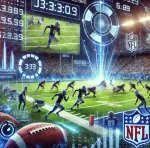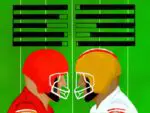This Sunday many American families and frat houses tuned into ESPN to watch their favorite football teams compete, but instead witnessed a nationwide protest. Players and some coaches and even Jerry Jones bent the knee in solidarity of two different things. What was intended as a protest against racial injustice was twisted and bent into a protest against President Donald Trump.
While protesting the questionable and frankly wrong things President Trump has said and done about people of color, as well as minorities of race and gender, it is not about Trump and never has been. The peaceful protest of sports players taking a knee during the national anthem was initially started by former 49ers quarterback Colin Kaepernick in spring 2016 to call out the continual injustices served against black Americans.
Like Ice Cube said in the 1988 release of “F*** tha Police,” “A young n**** got it bad ’cause I’m brown/and not the other color, so police think/they have the authority to kill a minority.” Since before N.W.A. went platinum, police brutality and racial injustice has been an issue, and Kaepernick would no longer stand for it.
The first time Colin Kaepernick refused to stand for the national anthem was August 14, 2016. His silent protest went unnoticed until August 26. When asked why he refused to stand, he replied, “I am not about to stand up to show pride in a flag for a country that oppresses black people and people of color.”
Fans across the country were outraged, and hundreds of videos showed 49ers fans burning the QB’s jersey, claiming he had no right to use his platform to protest his personal beliefs. Police officers refused to escort Kaepernick in and out of the stadiums, and he was slandered across the internet.
On September 1, 2016, Kaepernick’s teammate, Eric Reid, bent the knee in solidarity with him, which later led to a snowball effect of peaceful protesting. Jeremy Lane of the Seattle Seahawks bent the knee that same day, and Megan Rapinoe, a midfielder for the Seattle Reign soccer team, followed suit just three days later. Over the course of the next year, the professional, collegiate and high school sports world saw team members kneeling in protest of the injustices that have been allowed to continue in this country. Many viewers felt that Kaepernick and the other players were disrespecting the flag and those who fight for it, but that was never his intention, which he stated to the NFL.
“I have great respect for the men and women that have fought for this country,” Kaepernick told league representatives. “I have family, I have friends that have gone and fought for this country. And they fight for freedom, they fight for the people, they fight for liberty and justice, for everyone. That’s not happening. People are dying in vain because this country isn’t holding their end of the bargain up, as far as giving freedom and justice, liberty to everybody. That’s something that’s not happening. I’ve seen videos, I’ve seen circumstances where men and women that have been in the military have come back and been treated unjustly by the country they fought have for, and have been murdered by the country they fought for, on our land. That’s not right.”
Since then, Kaepernick, who is one of the highest-ranking QBs in the country, with a 90.7 percent passing rate, and partly responsible for three of the best seasons the 49ers have seen in years, has not had a job playing football. Since March 2017, when he was released from the 49ers, no team in the NFL has opted to pick him up, despite analysts arguing that he is objectively more talented than many of the other quarterbacks currently in possession of starting positions. Though others have offered less plausible explanations for why all thirty-two teams have neglected to give him a chance, since that fateful day in August 2016 when he first sat during the National Anthem, nothing about his performance on the field has changed, only his marketability in the eyes of general managers.
Kaepernick and those following his example are protesting the police brutality and wrongful treatment of not only black people, but of people of color in general, by the American judicial system, which includes the mass incarceration of people of color that has been happening since the late nineteenth century. According to NAACP’s fact sheet, people of color, which includes Hispanics and Native Americans, are incarcerated at a rate five times higher than that of white Americans and 56 percent of all Americans incarcerated today are POC.
To put those statistics into numbers, that’s 4,107,143 people. Millions of fathers, brothers, uncles, sisters and mothers are in jail, and many are innocent. African Americans who are jailed for murder are 50 percent more likely to be innocent than white convicts facing the same charges, and innocent black individuals are twelve times more likely to be convicted of drug-related crimes than their white counterparts. And outside of the jailhouse, black citizens are twice as likely to be shot and killed by a police officer while unarmed than white citizens. The facts are there and have been there for a long time.
This past Sunday, NFL players and some coaches bent the knee in protest of these injustices, but before the day had ended, for many, the object of the symbolic protest had shifted. Many of those who opposed the initial aim of the protest bent the knee not to raise awareness about racial inequality, but to criticize President Trump’s comments. So, next to those kneeling for kids such as Mike Brown and Trayvon Martin, who were murdered by police, were players kneeling in protest of Trump and his political views, which was not the original intent of the action. Either way, the president was not happy.
Up until his Sunday night football was disturbed, President Trump had refused to acknowledge the injustice people of color in America experience. Oblivious as to why the players were kneeling in the first place, the president appeared more concerned about the money the owners would lose from the declining viewership than the reasoning behind the political statement.
On Sunday, Trump voiced his opinion via Twitter: “Sports fans should never condone players that do not stand proud for their National Anthem or their Country. NFL should change policy!” And again on Tuesday Trump tweeted, “Ratings for NFL football are way down except before game starts, when people tune in to see whether or not our country will be disrespected!”
Clearly he isn’t happy, but it’s not about him; it’s about the hundreds of thousands of POC who are being wronged by the country they are supposed to respect. So where is Kaepernick today? He is continuing his fight for equality and justice by donating to organizations with the same mission and starting the Know Your Rights Camp, a free campaign for youth fully funded by Kaepernick to raise awareness on higher education, self empowerment and instruction to properly interact with law enforcement in various scenarios.
So even off the field he’s making plays, this time for a much larger team.
















